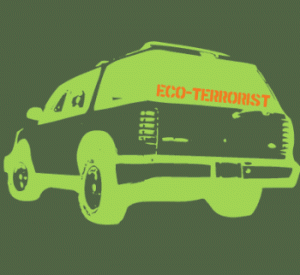After my recent post about the EPA’s list of environmental criminals not being labeled “eco-terrorists,†my nerdiness got the better of me and I couldn’t help thinking about grammar. The meaning of that term, “eco-terrorism,†isn’t intuitive or even logical. Depending on who is trying to use fear of “terrorism” to push a political agenda, the word has been grammatically twisted to have at least 3 definitions:
- Using the environment to terrorize. Charles Krauthammer, a conservative columnist at The Washington Post, used the term to describe Saddam Hussein: “Saddam was unquestionably the greatest eco-terrorist in history. During the Gulf War, he produced the worst deliberate oil spill ever. He followed that with the worst oil-well fires ever. Then came perhaps the most astonishing ecological crime in history: deliberately draining the marshes of Southern Iraq…â€
- Terrorizing the environment. That’s how the term has been used by both wildlife officials in Canada and the Earth Liberation Front Press Office, to name a few.
- Terrorizing in defense of the environment. The FBI defines “eco-terrorism†as “the use or threatened use of violence of a criminal nature against innocent victims or property by an environmentally-oriented, subnational group for environmental-political reasons, or aimed at an audience beyond the target, often of a symbolic nature.â€
The third use has become the accepted grammatical usage, thanks to sustained media campaigns by the FBI, corporations, corporate politicians and anti-environmentalists like Ron Arnold, who claims to have invented the term.
Yet, of those three definitions of “eco-terrorism,†the third is only one that hasn’t involved a single loss of human life.
Which definition do you think is the most appropriate?
